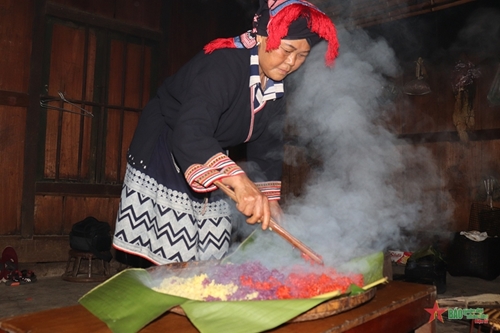May 01, 2022 | 21:29 (GMT+7)
Dao Tien ethnic people celebrate Thanh Minh Festival
PANO - Along with many cultural traditions, the Dao Tien people in Moc Chau, Van Ho, and Phu Yen districts of Son La province annually celebrate Thanh Minh (Day of the Dead) Festival, which is an opportunity for descendants to reunite, pay filial piety to their deceased parents, and commemorate their ancestors’ merits.
Thanh Minh is the name of the 5th solar term of the traditional lunisolar calendar which divides a year into 24 solar terms. Therefore, there is no fixed date but normally it falls between the end of February and the beginning of March on the lunar calendar. On this occasion, the Dao Tien people would hold the worshiping ceremony at home instead of visiting the ancestors’ tombs.
    |
 |
|
Colored sticky rice is one of the indispensable dishes of the Dao Tien people’s Thanh Minh Festival. |
The offering tray is simple, consisting of colored sticky rice, fish, bamboo shoots and wine, conveying the descendants’ respect and gratitude to their ancestors. The most difficult and time-consuming stage in preparing the feast is pounding sticky rice, picking coloring leaves, and digging up turmeric to make sticky rice more colorful.
Men prepare fish in a variety of ways such as frying, grilling or braising. They also boil bamboo shoots picked from the forest. The Dao Tien people believe that each fish represents a house being repaired; bamboo shoots represent materials to repair houses; colored sticky rice and liquor are rewards to thank the “hidden shaman” who help repair the house. Family members pray and invite their ancestors to enjoy the festival once the offering tray is fully arranged.
The Dao Tien people usually burn incense to worship their ancestors by themselves, but some might ask a shaman in the village for help. The worshiping usually takes place in the morning, the sooner the better, because in the Dao Tien’s belief, their ancestors will find better materials in the forest to build houses if they worship early.
Afterwards, all guests and family members have a meal together and share their own stories about lives. The Thanh Minh Festival is more significant with the scent of delicious fish dishes, the vibrant colors of sticky rice, the bitter flavor of bamboo shoots, and a glass of strong liquor. This is also an occasion for the Dao Tien people to hold cultural, artistic and sport exchanges, creating an atmosphere of joy, solidarity, and peace in the village.
Translated by Tra My - Huong Giang - Hong Hanh - Huyen Linh